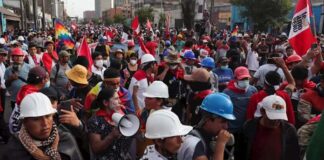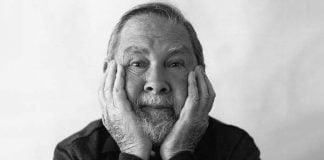Venezuela’s president Hugo Chavez has died after a long fight with cancer. Mike Gonzalez looks back at Chavez’s life—and the Venezuela he leaves behind
If revolution is the moment when the masses take to the stage of history, then Hugo Chavez’s Bolivarian Revolution began on 11 April 2002.
A right-wing coup kidnapped him and proclaimed a new government. It lasted barely 48 hours. Tens of thousands of Chavez supporters surrounded the presidential palace demanding his return. Later that year, the right launched a bosses’ strike with the intention of paralysing the oil industry on which the country depended. This too was defeated by the mass mobilisation of Chavez’s supporters.
His victory in the presidential elections in 1998 hadn’t had much resonance outside Venezuela at the time. But within the country the effect was dramatic.

Chavez’s election manifesto was anti-imperialist, specifically hostile to the US which had dominated Venezuela throughout the 20th century. It was nationalist, under the banner of Simon Bolivar, leader of Latin America’s 19th century independence movement. And it promised a reform of the corrupt state machine and its system of patronage.
Between 2002 and 2005 the Bolivarian process took a new and more radical direction. The state oil company was placed under direct state control. Until then it had operated autonomously, like any other multinational. Its profits then funded programmes of social reforms—in health, education and housing in particular—driven by rank-and-file organisations called missions.
In 2005, speaking at the World Social Forum, Chavez announced that Venezuela was constructing “21st century socialism”. While it was received joyfully, it remained unclear what it meant. It was clearly different from Stalinism, emphasising democracy and popular participation, and it was radically anti-imperialist.
In a series of electoral tests it became clear that Chavez’s support was growing. In 2006 he won the presidency again with over 60 per cent of the national vote. Some weeks later he announced the formation of a new party, the United Socialist Party of Venezuela (PSUV).
Had the revolutionary nationalist become a revolutionary socialist? If the transformation was real, then the PSUV would be an expression of power passing directly into the hands of the mass organisations, which was the brief expectation of many on the left. Nearly six million joined the new party. But its model appeared to be the Cuban Communist Party, not noted for its democratic character.
The irony of the Bolivarian revolution is that its undoubted social advances were made possible by the rising price of oil. This funded the social programmes and oil remains the country’s main export earner.
Yet, despite the hysteria of the anti-Chavez camp, there was no policy of redistribution. Some firms were nationalised and compensated at market rates, but for the most part only when they were abandoned or guilty of the most barefaced manipulations.
The year 2006 was in many ways a crossroads. The creation of Latin American blocs such as ALBA and CELAC were expressions of Chavez’s Bolivarianism, his Panamerican vision.
Yet this was not the 21st century socialism, the democratic revolution, that had been promised. In Venezuela a new elite was emerging, a dominant bureaucracy in red caps and T-shirts. At the same time inefficiencies, the failure to complete major projects, and the incorporation of mass leaders slowly undermined the mass organisations whose struggles had carried Chavez to power.
Every vote confirmed Chavez’s immense popularity. But conversations at street corners testified to an increasing frustration. Public denunciations replaced debate. And power was becoming concentrated on Chavez and his immediate circle.
But it was not the idea of creating an alternative capitalist bloc that had brought Latin America’s mass movements on to the streets. It was the promise of “people’s power” that made Chavez such a potent symbol of a different, socialist future.
On the eve of his last journey to Havana for medical treatment, Chavez assured his television audience that he was leaving a strong collective leadership behind him. In fact the power of the Chavista state was concentrated in Chavez himself. Without him the sectional interests and power hunger of individual members of his government are almost bound to emerge and conflict. No one has the charisma that Chavez undoubtedly possessed.
The alternative that faces Venezuela after Chavez is either the growing use of a state that claims his name but cannot claim his influence, or the re-emergence of a powerful mass movement still ready to struggle for “people’s power”.
He left behind a language of liberation and solidarity, but the structures to turn them into a new and different kind of society have yet to be built.





